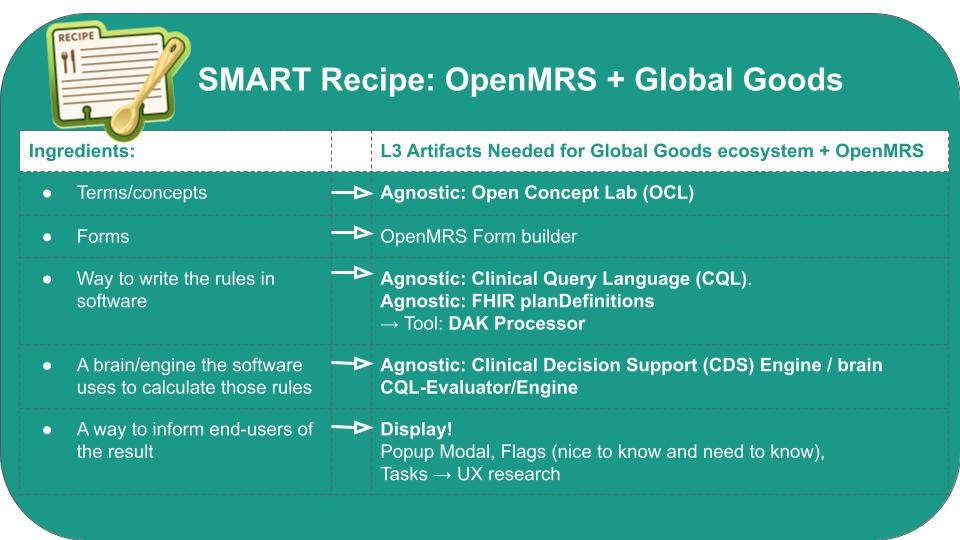A SMART Recipe for Adapting SMART Guidelines for OpenMRS
For years, health care workers spent considerable time and effort navigating various guidelines for patient care coming from their own ministries of health as well as global bodies. At the same time, the OpenMRS community has long sought a solution for Decision Support rule authorship and calculation. SMART Guidelines offer countries and global goods a potentially faster pathway for providers to adopt evidence-based practices for high-impact service areas. SMART Guidelines are easier to review than text-heavy PDFs (see the structured approach in this Antenatal Care Decision Support rubric for an example). But the vision goes further: the WHO hopes that best-practices will reach bedside care much faster by connecting SMART Guidelines with existing software platforms.
In 2023, an opportunity arose that led OpenMRS to dive deeply into applying SMART Guidelines to OpenMRS – and to become one of the first Global Goods to digitize targeted SMART Guidelines use cases from WHO’s Digital Adaptation Kits (DAKs) for Antenatal Care (ANC) as well as HIV Care and Treatment.
Following a “SMART recipe” for OpenMRS, a group of organizations collaborating through the OpenMRS Community showed that our existing Global Good tech can improve our current technology and integrate some aspects of SMART Guidelines. While some of this tooling is not yet production-ready, the SMART Squad’s experience can inform future directions that will resolve gaps and challenges critical to making new SMART tooling available to implementers for use in production.
The SMART Challenge
Adapting and scaling care and treatment guidelines for almost any service area – whether immunizations, ANC, or HIV – into digital systems like OpenMRS can be resource-intensive and difficult to use in other settings, particularly when implementations build these solutions on their own. Our community wanted to know if the recommended SMART Guidelines tooling pipeline could help us achieve a community standard Decision Support tooling chain that could also be leveraged by any other SMART Guidelines or OpenMRS implementer needs.
The Solution & Its Results: SMART Recipe for OpenMRS
The OpenMRS SMART Squad defined an approach that brings together existing and/or platform-agnostic tooling into a technical workflow that implements ANC DAK requirements along with the recommended SMART Guideline technical tooling. In addition to being standards-based, this approach re-uses existing OpenMRS tech and integrates existing Global Goods and Open Source Software.
- Open Concept Lab (Global Good) to map concepts aligned with WHO codes;
- OpenMRS’ Form Builder (existing OMRS resource) to create a prototype form that triggers the workflow;

3. CQL Engine (OSS) and FHIR IGs with planDefinitions (Standard) to write the rules in software; and,
4. Improved Patient Flag Module and FHIR Module (existing OMRS resources) to inform end-users of the result through flags, tasks, and support program indicator reports.
This work also underscores the position of community tech leads from a number of OpenMRS implementations: running reports outside of the transactional EMR is a more efficient approach to program indicator reporting. Three organizations, PATH, Intellisoft, and Palladium Kenya, recently focused their SMART work on HIV indicator reporting, showing that using the CQL Engine for reporting with a separate FHIR database works better.
Sustaining Success
By design, the OpenMRS Community promotes open, collaborative development of shared OpenMRS features and functionality that can be used for any health program or service area – and configured based on country & health program needs. This approach to sustainability means that OpenMRS’ SMART recipe and resulting tooling is more likely to be widely adopted and maintained over the long term when it enhances and becomes shared, community technology. To increase the likelihood of community adoption, OpenMRS intentionally engaged both technical and ANC subject matter experts from multiple countries and organizations implementing OpenMRS to adapt OpenMRS SMART tooling: Partners in Health, Sonder Collective, Intellisoft, Palladium Kenya, PATH, and Mekom Solutions. Several members of OpenMRS’ Global Product Support Team helped to coordinate and advance the work throughout the year.
Read more about our SMART Guideline Journey and future directions or watch our OpenMRS & The ANC DAK SMART Guidelines Showcase.
